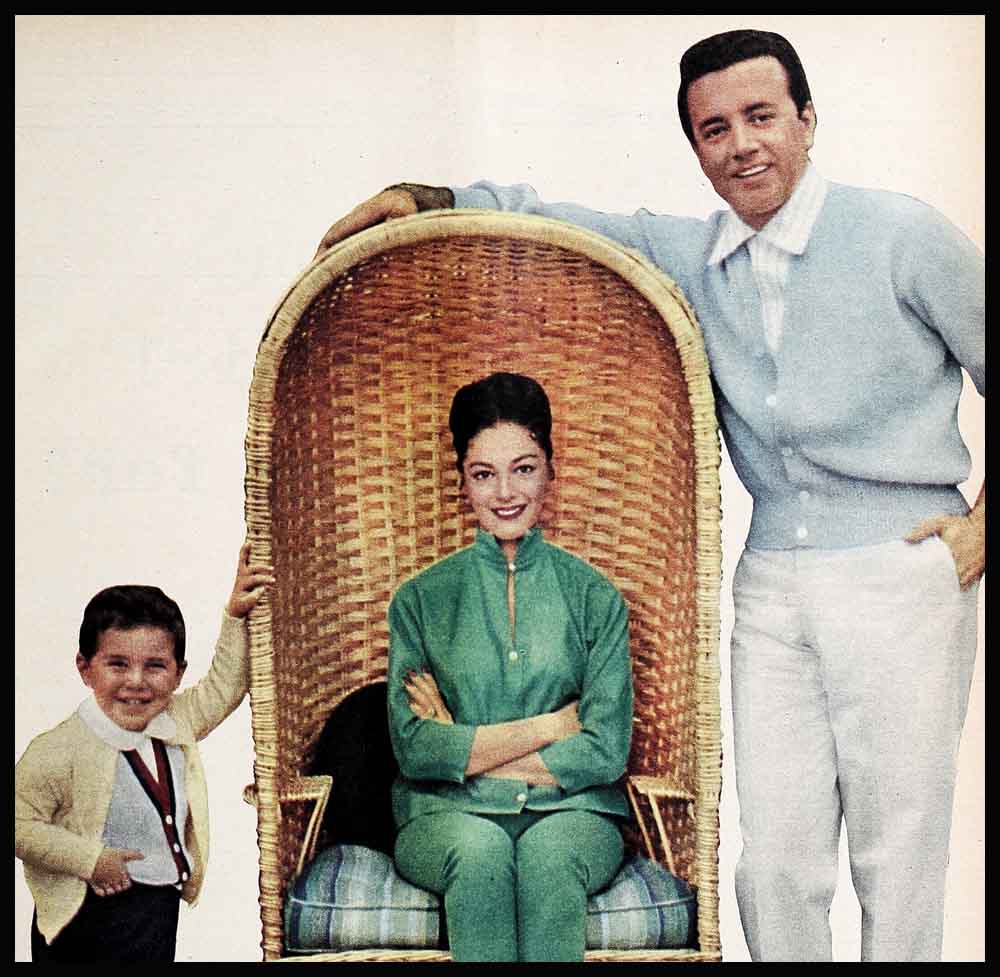
Three Against A Storm
Vic Damone said wistfully, “A wife’s place is in the home. I would like it if Anna could always be there.” He was thinking as he spoke that his words were futile, because “Anna” is Anna Maria Pierangeli, his beautiful and talented actress wife. At the moment Pier was back home, in the lovely house Vic bought, situated at the end of a dead-end street, nestled under a protecting mountain. But Vic was thousands of miles away, filling a night-club engagement at the Copacabana in New York. And Pier, who had been with him, had returned to Hollywood the day before “for business reasons.”
The storm that has surrounded the Damones is no secret. Vic has talked about it at length in print, and the gossip columnists have not failed to take advantage of the slightest gale, often blowing it up into a full-sized Nor’wester.
Actually, Vic’s nature is of such a texture that it is not one to blow with the wind, but to stand against it and fight it, even when just going indoors and taking shelter would be so much easier for all concerned. Because he is fashioned the way he is, he seeds the clouds. He creates some of his own troubles. Were he able to ignore small things which he considers slights or interference or willful attempts to hurt, he might forestall some of the stress which has dogged him.
Much of this stems from his extremely sensitive nature, and from an innate sense of insecurity.
If people can be too much in love for their own good, the Vic Damones are those people. Anna (Pier) can see no flaw in her mate. He is perfection. Vic worships her and their two-and-a-half-year-old son Perry (named for you-know-who). Neither courts outside companionship. They give their all to each other.
This might be fine on a desert island, but in the world of show business, where separations are necessary and one or the other is left, it is another story. They both discovered at an early age that being in the public eye invites adulation which is not always sincere, and it has made them wary. Rather than separate the wheat from the chaff, weed out the people who want to know them for who they are rather than for what they are, and select carefully some good friends to enlarge their horizons, they live solely for each other, their baby and their careers.
Were the Damones farmers instead of famous, their chances for happiness might be greater. Then Vic would not have the demon fears about the possibility of losing his Anna. He would not anticipate the probability of having her wooed away by some outside force, such as a movie studio or some unknown bugaboo—at least, a bugaboo in his mind. But even on a farm it wouldn’t be surprising if some smart scout discovered Pier Angeli. Beauty such as hers would not be left to blush unseen, except by Vic. He would like to be the sole observer.
The reason he wants her all to himself is that he loves her so much. But such an all-consuming love can become stifling. Not that Pier Angeli thinks so. Vic is everything she wants in a man. She told me so.
“Vic is a gentleman, to begin with,” she has said. “He is thoughtful, generous, handsome. He is generous in thought as well as with the money. For example, we have a housekeeper, Mrs. Agres, who is with the baby when I have to be away. Vic takes her in like part of the family. If we have some occasion to celebrate and we open a bottle of champagne, he calls her in, asks her to bring an extra glass and sit down to join us. He noticed the gardener was smoking a pipe. Right away he went and bought him a beautiful lighter . . . Little things like that Vic does. He is a good man . . . The best.”
The Damones do not have friends. They do not entertain. Theirs is a self-contained home, a paradise for three, if you like. With this they are content, even happy, except for the specters which Vic cannot dispel, the real and sometimes imaginary spooks that haunt him and often make him miserable.
What are these worries? A man endowed with such a wife, a fine baby and a six-digit annual income has little to worry about. But Vic thinks differently.
When I called about this interview, he seemed skeptical, although he knew I had talked at length with Anna earlier in the week. I realized he was busy, and probably unhappy because Anna had left.
Also, there had been some discussion in the columns about a recent article in a magazine in which he felt he had bared his soul. Maybe he didn’t want to be misunderstood again.
“What is the story to be called?” he asked. Rather reluctantly he agreed to see me, and when he actually got into the spirit of the interview he talked at considerable length.
When I arrived, there were two callers in the room and the TV was on. Presently the phone rang, and it was Vic’s manager, Milt Ebbins. Vic asked him to join us. I had the sneaking suspicion Vic wanted him there in case I asked embarrassing questions concerning some of the things he had said in the article. Mr. Ebbins didn’t look forbidding. Vic sensed the difficulty. He turned off the TV set and had the telephone cut off. It had been ringing almost constantly.
I asked him what the baby calls him, and. as might be expected he calls him Daddy. Sometimes he calls his mother Anna. I also was told that one of the big moments for Vic was the time when he arrived home after an extended tour and the baby announced: “I love you, Daddy.” And once, probably because a tooth was coming in, little Perry only cried over the telephone when Vic called him and wouldn’t say a word. Perhaps he has inherited some of his father’s mercurial disposition.
Vic attributes many of his own traits to the fact that he was born in June, the twelfth to be exact. Astrologers do say that people born under the sign of Gemini have dual personalities. Gemini means The Twins.
I asked Vic why he was so wary of people. His answer was revealing. “in show business you meet so many people who want to use you—phonies, hangers-on. They are the people who love you—until you need them. They don’t love you. They love the spotlight.
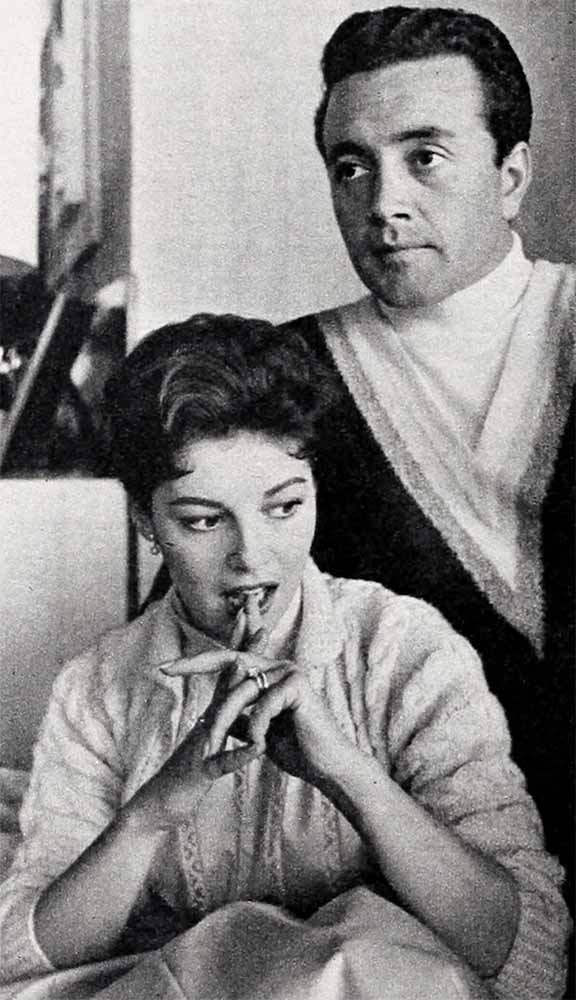
“One time I asked some so-called friends to lend me money. They found various excuses for not Corning through. I think I did it just to test them. I thought I would be disappointed, but I wanted to be sure. But—and here’s a refreshing twist—there was another man I knew, who heard about this and was furious that I hadn’t asked him. One friend among the lot! Not very encouraging.
“I think a test of friendship is this: You wouldn’t ask a friend to do anything for you that you wouldn’t be willing to do for him. But how many people can you feel that way about? Giving, either materially or of yourself, is a two-way thing. Oh, I have acquaintances, many of them. But friends? I could count them on the fingers of one hand and still have plenty of fingers left over. Sooner or later people let you down.”
Granted that Vic was pretty successful before he was mature enough to judge people well, and did get taken in by the “phonies” he mentions, there are many youngsters these days who gain success who don’t go about feeling disillusioned about people. But because Vic perhaps is too sensitive for his own good, he is quick to take offense. He recalls a relative who used to belittle him in his childhood. Many boys have an uncle or an aunt like that. They may bridle under the teasing at the time, but they don’t retain the resentment when they mature. Vic still cringes at the memory, and he’s easy prey to worry and fear.
Pier rationalizes this in her own wifely and protective way. I asked her why Vic had said in an interview that when he left home he was always afraid that the house would burn down or that he would be killed in a plane crash.
“But the house nearly did burn down,” she championed. “There was this big fire in the neighborhood. Why shouldn’t he worry about such a thing?”
Vic’s fears extend even further. He fears he might lose his Anna. “Suppose,” he said, “she goes abroad to make a picture for six months. There are many handsome and charming men abroad.”
I interrupted. Certainly this was unjustified fear. “Anna has talked to me many starry-eyed times about her great love for you,” I said. “Such a possibility certainly seems out of the question.”
“It isn’t that I distrust her love,” he hurried to explain. “But those men. One could take her away from me. It has happened before. Look at Ingrid Bergman.”
The ringing of the phone interrupted, because Vic had put in a call to his wife in California. When he had completed the call he smiled.
“I think I am getting better, because I am letting Anna go to the premiere of her picture, ‘Merry Andrew,’ tonight by herself. Six months ago, I wouldn’t have allowed it.”
“Now who is going to gobble her up going from her home to the theater?” I chided him. Vic shrugged, twisted his handsome features boyishly.
This couple comes from such different backgrounds. If their love were not so great, they probably would have separated long since. Vic’s father was a workingman, and the family lived on his ninety dollars a week. Vic would like his present home to be like the one he was brought up in: the wife to be at home all the time; the husband to be the breadwinner.
This is a laudable ambition—a typical American man’s desire—but when the wife is a beautiful and talented actress, it is difficult for her to be a full-time housewife, especially in Anna’s case, for she has been brought up not to be one.
Life in a well-to-do family in Italy and life in a workingman’s family in Brooklyn are miles apart in more ways than one.
Pier explains one misunderstood remark made in a magazine article by Vic; something to the effect that “Anna was not brought up to be a wife and mother . . . or anything else but an actress.”
“What he meant,” she says, “was I was not trained to bake the bread, scrub the floor, do the ironing.” Of course, Vic wouldn’t want her to do all the household chores. He can afford help, and probably he’d be delighted to let Anna just sit there on a pinnacle all day while he worshipped her. But would this be a complete life for her?
It wouldn’t necessarily mean being with Vic. According to his own calculations, his work takes him away from home the better part of the year, to many places far from California. “You know,” Pier told me, “in the three years we’ve been married, last Christmas was the first we had together in our own home. And last November twenty-fourth was the first wedding anniversary we could spend together.”
Christmas of 1956 stands out in her mind. She was barely out of bed after the loss of her expected second child. Vic was in New York. As Pier and baby Perry spent a sad day together, a friend brought them a little Christmas tree. “But I didn’t want it,” Pier remembered.
“It was so lonely,” she went on. “It’s always lonely when Vic is away.” Then her face brightened. “When he’s home we always laugh, have music, talk talk talk, make little things important, make the big decisions. We have the day with Perry. We have the beautiful dinner—candlelight, wine, lovely food. Just for us to eat together is so wonderful. Then we watch the television or go to the movies. We are both mad for the movies. We will go to the neighborhood double feature and we eat the popcorn. When we come out, maybe it is one o’clock. If we see another movie somewhere, we will go to that, too—still eating popcorn. We come home full of film and popcorn. We are content. Our life is so filled, we don’t need other people. We don’t need to go socializing.”
She wasn’t merely parroting her husband’s opinion. In one respect, Anna’s experiences have duplicated Vic’s. When she and Marisa and their mother first came to Hollywood, the girls preferred to have their dates at home. Mama cooked and loved to see people eat. Since all three loved people, their home became a happy haven for many. But slowly it dawned on them that no one reciprocated. They were not asked to the homes of their guests. Finally, they were forced to acknowledge—just as Vic was—that many of their “friends” were the phonies and hangers-on of Hollywood.
Pier never forgot that lesson. Today, when someone runs up to her gushing about a performance she’s given, she is polite but noticeably withdrawn. And, talking to a real friend, she can call the turn on a phony. Startled, the friend will protest. Pier’s quiet “Wait and see” is invariably justified. “People disappoint us,” she told me wistfully. “I feel sorry for them. A little while ago, I was very sick in the hospital, and Vic was on tour, and the only person who offered to take me home was a friend from M-G-M Publicity.”
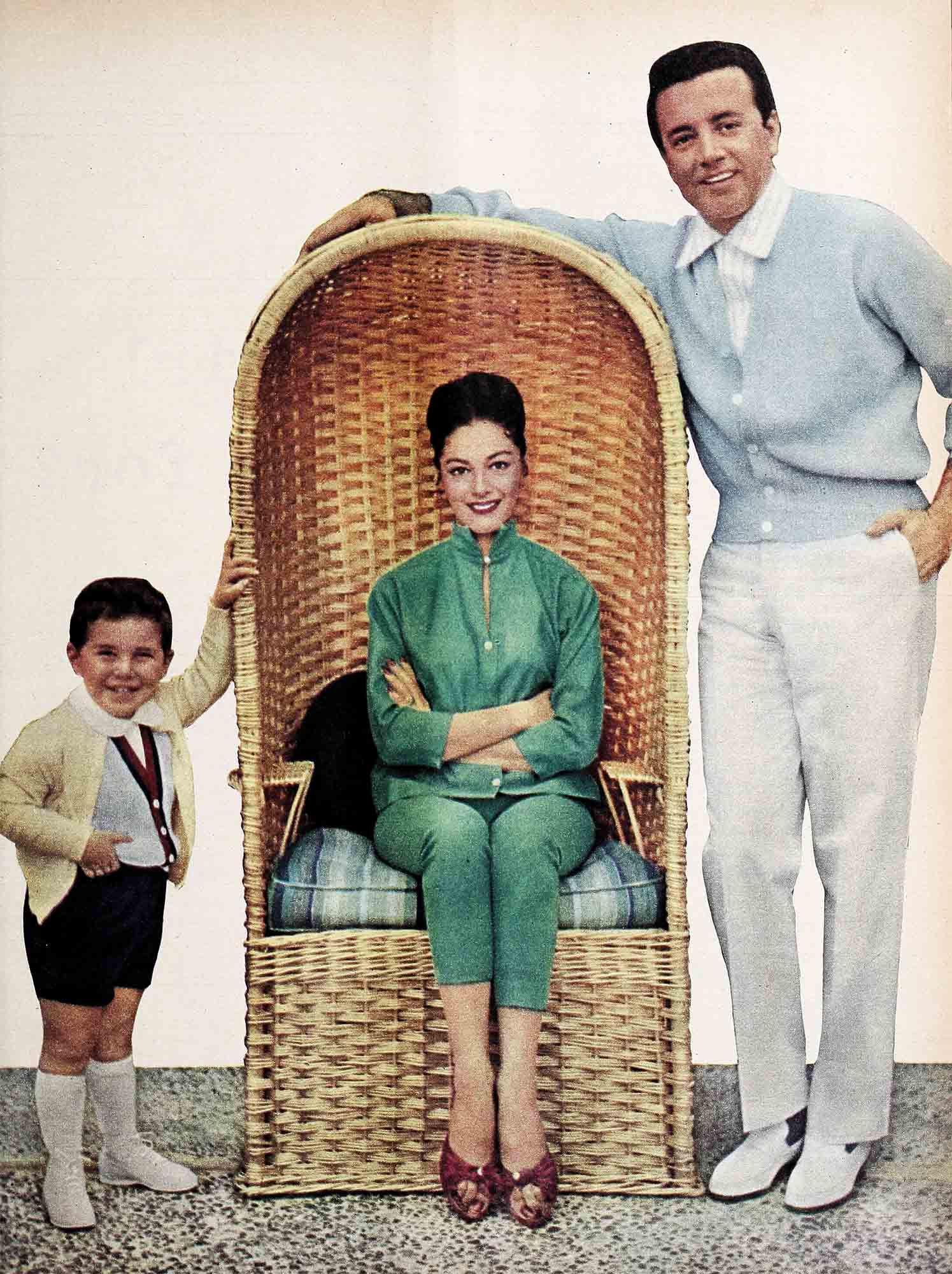
Slow to form friendships, she can’t depend on constant company to fill her spare time or keep her from being lonely while Vic is away. “Just lately,” she said, “I have found a friend. She is Anna Kashfi. We talk. We confide. We are like sisters. I like this very much.” She prizes such an association all the more because for her it is so rare.
Seeing only one solution—to spend more time with Vic—Pier recently asked to be released from her M-G-M contract. She is not giving up her acting career; no one, including Vic, would expect her to. When she finds a role she likes—such as the heroine in “Merry Andrew”—she will take it. But, without a regular studio commitment, she will be free to go with Vic sometimes on his engagements.
Even so, the Damones won’t always be able to avoid certain dangers created by columnists’ hunger for hot items. There was the time Vic was playing Las Vegas. It was reported that he was gambling like a fiend and that Pier had flown in suddenly to give him what-for. Here’s what actually happened. At the moment when Pier was supposed to be telling Vic off, she was in a doctor’s office. She had planned to go to Las Vegas with Vic, taking Perry. But she had two impacted wisdom teeth, so she promised to make the trip as soon as the painful dentist chore was finished. Then Perry fell on the patio and hit his head on a rock. As Pier stood by in the office the doctor was taking eight stitches in the baby’s face. When she returned home, white and shaken, she learned of the gossip item. She called Vic, and they commiserated with each other. Then Pier and stitched-up Perry boarded a plane for Las Vegas. There the Damones gave the lie to the rumor by simply being themselves.
True, when Vic is alone in Vegas, he spends part of his time on the phone to Pier, part wandering miserably around the hotel. Being alone, he gambles, but certainly never for amounts that would hit the headlines or cause his wife to scream at him. The insidious effectiveness of that rumor lay in the fact that it was based on a grain of truth.
Realizing that such confusion may threaten her again, Pier still clung to a decision about her own travels. “I will stay home more now,” she said. “it is good for a marriage.”
“My mother was always at home,” Vic explained—indicating Anna’s decision must have been influenced by him. “She was the first woman in my life always. Then when I met and fell in love with Anna, my mother said: ‘When you marry, then I must no longer be first. Your wife becomes that. It is the way it should be.’ ”
A good deal has been written about mother-in-law trouble as far as Anna’s mother and her son-in-law are concerned. Enough has been said. But since it is a part of the whole picture and Vic has gone into detail about his lack of rapport with his mother-in-law, and has told things in print about his feelings, it cannot be completely ignored.
It is a wonder Anna has not been emotionally torn apart, being in the middle, wanting to please her husband, wanting to be thoughtful of her mother.
Pier’s twin sister, Marisa Pavan, and her husband. Jean Pierre Aumont, spend considerable time abroad, so there is only Pier to shoulder the responsibility of her widowed mother’s now lonely life.
It has been reported that Vic has come to many an impasse with his mother-in-law. He wrote that at one time he had requested her to leave his house. Anna has never said how she felt about this. Nor did I ask her. I felt it was a personal matter and in the past. From Mrs. Pierangeli’s point of view, she had brought her girls up, hovered over them in the very strict and close manner only a devoted European mother would think proper. She was a zealous chaperone. She called the curfew hour. She held the keys.
I recall meeting Pier Angeli one time for lunch in London when she was in her late teens. I went to the Savoy Hotel, where she and her mother were staying. She emerged from the elevator triumphantly dangling the apartment-door key around her finger.
“See this?” she said jubilantly. “This is the first time my mother lets me have the key. I can come and go when I like. I am a big girl, eh?”
I imagine even this small privilege was a considerable concession for Mrs. Pierangeli. With two beautiful young daughters to guard and guide, perhaps she was overly cautious. Maybe the mental scissors with which she was trying to cut the apron strings were not sharp enough.
Then when both girls left home to marry, a large slice of her interest in life was cut off.
It has been said that Mrs. Pierangeli wanted to be a great actress and transferred this ambition to her daughters. If this is true, it is sad. One cannot successfully mold another’s life to the requirements of a lost cause. It is doubtful if Mrs. Pierangeli wanted to do this. But there are others who believe this is true and feel Mrs. Pierangeli resented Anna’s marriage and from the beginning was a dominant force.
It is understandable that Vic, wanting to be head of his house, did not welcome ideas from his mother-in-law about Anna.
Maybe if he and his mother-in-law had learned to compromise, they would have saved Anna, whom they both love so much, many a heartache.
Vic said, “I want the challenge to take care of my wife and my baby.”
“Why not say ‘our’ baby?” I suggested.
He gave me a startled look.
“Our baby,” he consented, after an uncomfortable pause.
“You are a lucky man to have Anna for a wife,” I said finally.
“She is lucky to have me for a husband.” His eyes were black and stormy for a moment.
I dared to ask why. He replied immediately, the words hurtling from his lips. “Because I am able to understand her. Because I am able to give her the love she deserves. Because I would never hurt her.”
He went on: “I enjoy being able to give her a beautiful house, beautiful clothes—anything she wants. I want to work for one reason, so I can do everything for her. I think of her so much when we are separated. I am a good husband.” He was sincere.
Anna told me that sometimes when they have a problem, they pray together. “Only last night,” she said, “something happened which disturbed Vic, and when he came back from the Club, he told me. We went to bed and prayed together. The next morning the trouble seemed to have disappeared. When we got up, we pulled the drapes and found the sun pouring in. We danced around the floor.”
Now, do we have an answer here? I hope so. Vic told me that once he had consulted a psychiatrist. “My life was involved, mixed up. I hated myself,” he said. “So I went to that doctor. But only once. I did not think I could be helped that way.”
Perhaps they have found the answer. Perhaps Vic will find that Somebody Up There does like him.
THE END
It is a quote. PHOTOPLAY MAGAZINE JULY 1958


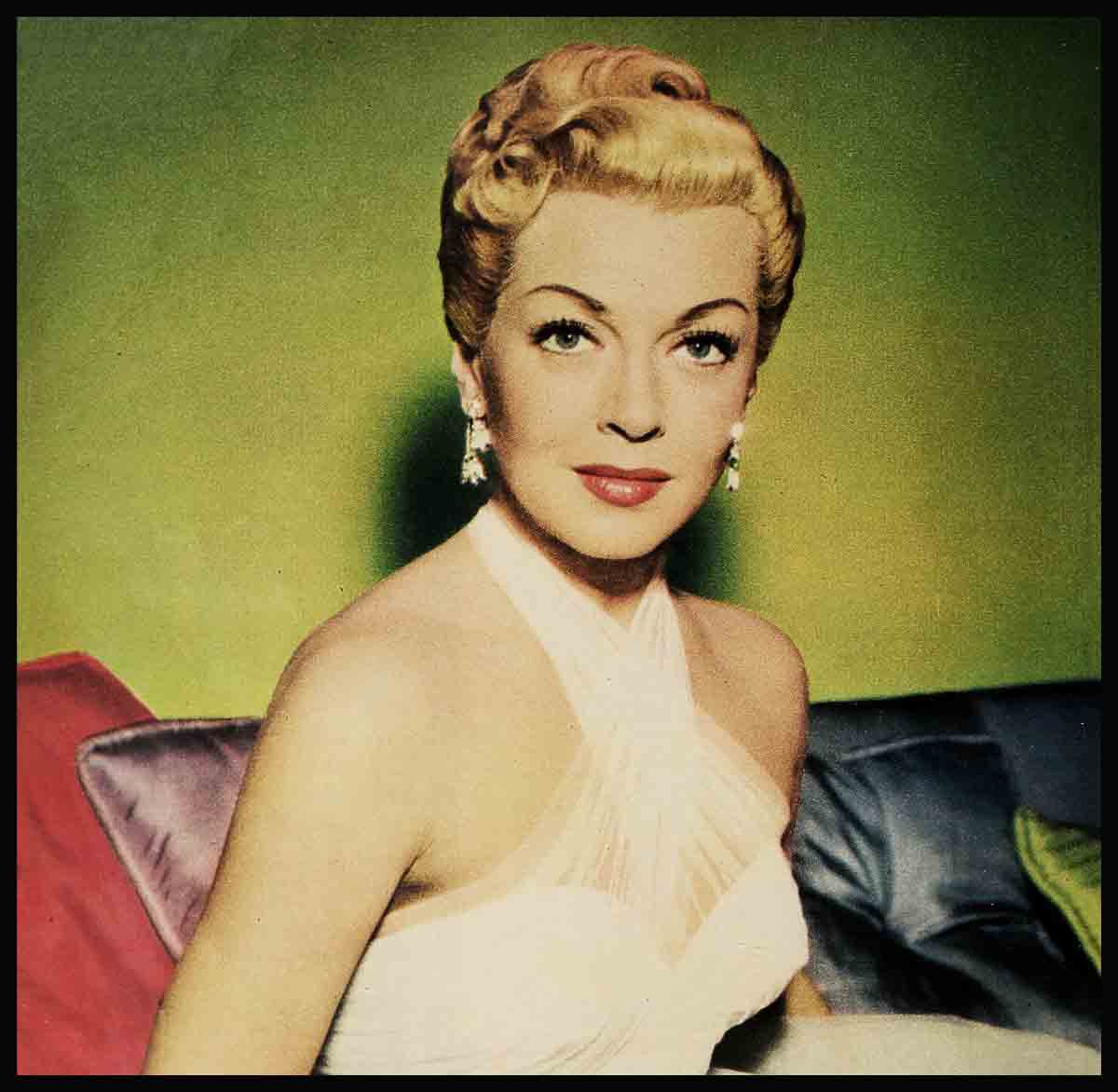
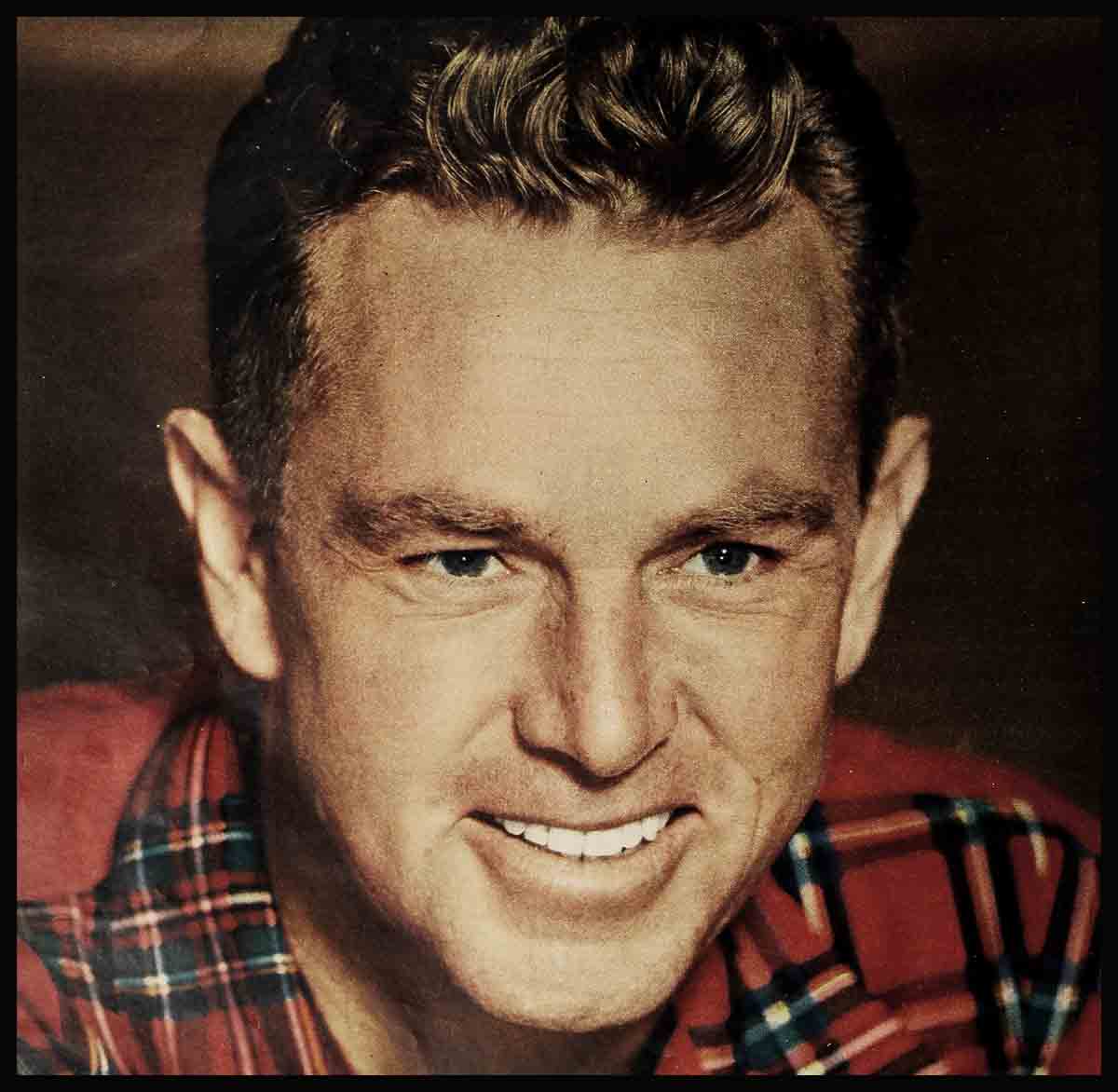

No Comments